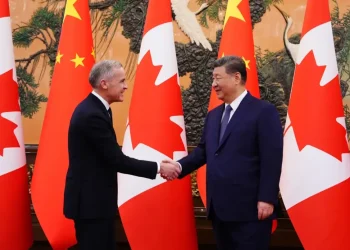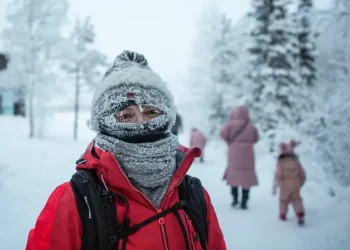Europe’s Growing Push for Wartime Preparedness: Will Citizens Respond?
As the geopolitical landscape grows increasingly tense, European nations are ramping up their efforts to prepare citizens for the possibility of conflict. From survival guides to evacuation drills, these countries are taking steps to ensure their populations are ready for what could come next. But, the big question remains: Will people listen and take these warnings seriously?
In recent months, several European governments have rolled out sobering guidance, urging citizens to rethink their mindset and brace for potential conflict. This shift in focus aims to ensure Europe is ready for a worst-case scenario, especially in light of growing tensions with Russia.
NATO Secretary-General Mark Rutte underscored the urgency, stating at a security conference in Brussels in December: “It is time to shift to a wartime mindset.” The message is clear: Europe must prepare for conflict and take steps toward resilience, especially as the threat from Russia continues to loom large.
European nations have begun offering practical advice to their citizens, from stockpiling supplies to creating emergency shelters. The European Commission has advised citizens to stockpile food and essentials for at least 72 hours in case of a crisis. This guidance, released in March, emphasizes the need for “preparedness” and “resilience,” crucial elements in navigating a potential war scenario.
Individual countries have taken additional steps to prepare their populations:
- Germany: Last June, Germany updated its Framework Directive for Overall Defense, outlining procedures for citizens in the event of conflict. The document envisions a major transformation in daily life, with citizens expected to adapt to wartime conditions.
- Sweden: Sweden has been particularly proactive, distributing millions of copies of an updated survival guide titled “If Crisis or War Comes.” The pamphlet provides step-by-step instructions on how to protect oneself, including going indoors, closing all windows and doors, and seeking shelter in underground spaces. Specific advice on how to survive nuclear attacks, manage anxiety, and even communicate with children during a crisis is also included.
- Finland: With its long border with Russia, Finland has long been focused on its defense. In the wake of Russia’s invasion of Ukraine, Finland has increased its preparedness efforts. The Finnish government boasts over 50,000 emergency shelters that could accommodate nearly 5 million people. Additionally, the country has issued updated guidance on how to prepare for disruptions in power, water, and telecommunications.
Despite these efforts, there’s no guarantee that citizens will embrace the preparedness plans. Claudia Major, a senior vice president at the German Marshall Fund, emphasizes the importance of these plans, not just in response to direct military threats but also to the “grey zone” between war and peace. This “grey zone” encompasses hybrid warfare and lower levels of aggression, which could destabilize nations without a full-scale conflict.
However, Major also notes the challenge of balancing preparedness with the risk of causing unnecessary panic. “We want people to be aware, we don’t want them to be freaked out,” she explains.
In countries with a historical memory of Russian aggression—such as Finland and the Baltic states—the threat is seen as more immediate and real. These nations have long understood the risks of Russian expansionism, and citizens are more likely to take the advice seriously. Major points out that these countries have learned from history and know they must be self-reliant.
On the other hand, nations like Portugal, Italy, and the United Kingdom may not feel the same urgency. Major highlights how Italy, for instance, is more concerned with threats from terrorism and instability in the Mediterranean region, while the UK, an island nation, has not faced a foreign invasion in centuries.
“The question is how do you change the DNA of a country?” Major asks, emphasizing that the real challenge may lie in convincing those less affected by the threat to take the necessary precautions.
Europe’s modern guidance on wartime preparedness isn’t without its challenges. Historical attempts at preparing civilians during times of crisis have been met with mixed results. A notable example is the UK’s “Protect and Survive” campaign, which ran from 1974 to 1980. The campaign aimed to prepare citizens for a nuclear attack, offering advice like how to create a fallout shelter in your home. While well-meaning, the campaign was often criticized for offering unrealistic advice, and it was even parodied in British media.
While the “Protect and Survive” campaign was mocked in popular culture, many experts believe that modern-day guidance—such as Sweden’s survival pamphlet and Finland’s extensive emergency preparedness efforts—is more realistic and takes into account the psychological impact of a crisis.
Claudia Major argues that preparing for conflict in today’s “grey zone” is crucial. She stresses that deterrence, defense, and societal resilience are essential components of modern security strategies. If European citizens are not ready and willing to support their nations in times of crisis, the continent’s ability to prevail in a war scenario could be severely compromised.
“Society must be prepared, not just militarily, but emotionally and psychologically,” she says. “If the society is not willing and not ready to support a war like the Ukrainian society is doing at the moment, we will not prevail.”
Europe is clearly taking significant steps to prepare for the possibility of war. However, the ultimate success of these plans depends on whether citizens truly internalize and act upon the advice. As tensions with Russia continue to escalate, the need for a united and resilient population becomes even more apparent. The challenge now is ensuring that Europe’s citizens are not just informed but also motivated to take action, should the worst come to pass.
The question remains: Will Europe’s civilians heed the call to prepare for the unthinkable, or will they remain unready in the face of an ever-growing threat?
This article was rewritten by JournosNews.com based on verified reporting from trusted sources. The content has been independently reviewed, fact-checked, and edited for accuracy, neutrality, tone, and global readability in accordance with Google News and AdSense standards.
All opinions, quotes, or statements from contributors, experts, or sourced organizations do not necessarily reflect the views of JournosNews.com. JournosNews.com maintains full editorial independence from any external funders, sponsors, or organizations.
Stay informed with JournosNews.com — your trusted source for verified global reporting and in-depth analysis. Follow us on Google News, BlueSky, and X for real-time updates.














